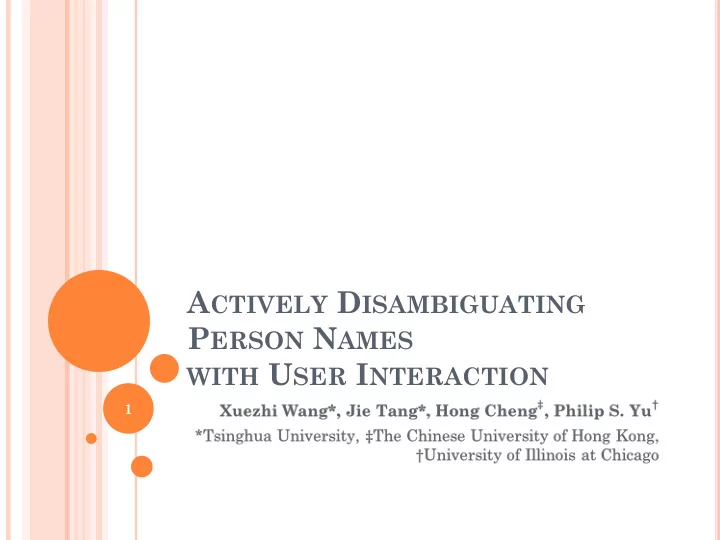

A CTIVELY D ISAMBIGUATING P ERSON N AMES WITH U SER I NTERACTION 1
M OTIVATION Search an author in DBLP Do these papers really belong to Cheng Chang, student from Tsinghua and later went to Berkeley? This paper actually belongs to Cheng Chang, from Hainan University. Search a name in a search engine Prof@Berkeley Which Bin Yu do you want to find? PostDoc@CMU 2
E XISTING M ETHODS F OR N AME D ISAMBIGUATION Supervised-based approach: Learn a specific classification model from training data Use model to predict the assignment of each paper Unsupervised-based approach: Clustering algorithms to find paper partitions. Papers in different partitions are assigned to different persons. Constraint-based approach: Utilizes the clustering algorithms. User-provided constraints are used to guide the clustering towards better data partitioning. 3
E XISTING M ETHODS WITH I NTERACTION Several problems: User has to check every result to see if it is correct No propagation, correction only based on user input 4
A LGORITHM D ESIGN How to combine features, relations and user feedback? Feature, between document pair and label Relation, between label and label User Feedback, constraint on partial labels We need a model to elegantly combine these altogether Inference on the model can give us the answer to paper assignment 5
F EATURE D ESCRIPTION A LGORITHM D ESIGN — P AIRWISE F ACTOR G RAPH M ODEL 6
L EARNING A LGORITHM FOR PFG Metropolis-Hasting Algorithm for 7 Approximate Inference
W HY A CTIVE N AME D ISAMBIGUATION ? Are they correct? How to find document pairs that are most likely to be wrongly classified? 8
U NCERTAINTY - BASED A CTIVE S ELECTION Does these papers belong to the same person? No! I NFLUENCE M AXIMIZATION - BASED A CTIVE S ELECTION Do these papers belong to the same person? Yes! 9
M ODEL R EFINEMENT 10
I MPROVING E FFICIENCY BY A TOMIC C LUSTER In practice, enumerating all possible document pairs can be really time-consuming and infeasible for an online system Atomic cluster-based method Atomic cluster: in this cluster every paper has very high probability that they belong to the same person Bias-classifier —— AdaboostM1, aiming to minimize the number of false positives, thus obtaining very high precision 11
D ATA S ET Publication Data Set From ArnetMiner.org, manually labeled 6,730 papers for 100 author names CALO Set Email Directory, labeled data set of 1,085 webpages for 12 names News Stories 755 ambiguous entities appearing in 20 web pages 12
E XPERIMENT Publication Data Set (Average) Precision 95.4% Recall 85.6% F1-score 89.2% CALO Set News Data Set 13
Result of active name disambiguation (MR: the model refinement) UB: Uncertainty-based active selection IM : Influence Maximization-based active selection How F1-score varies with number of queries 14
Thank you! 15
Recommend
More recommend